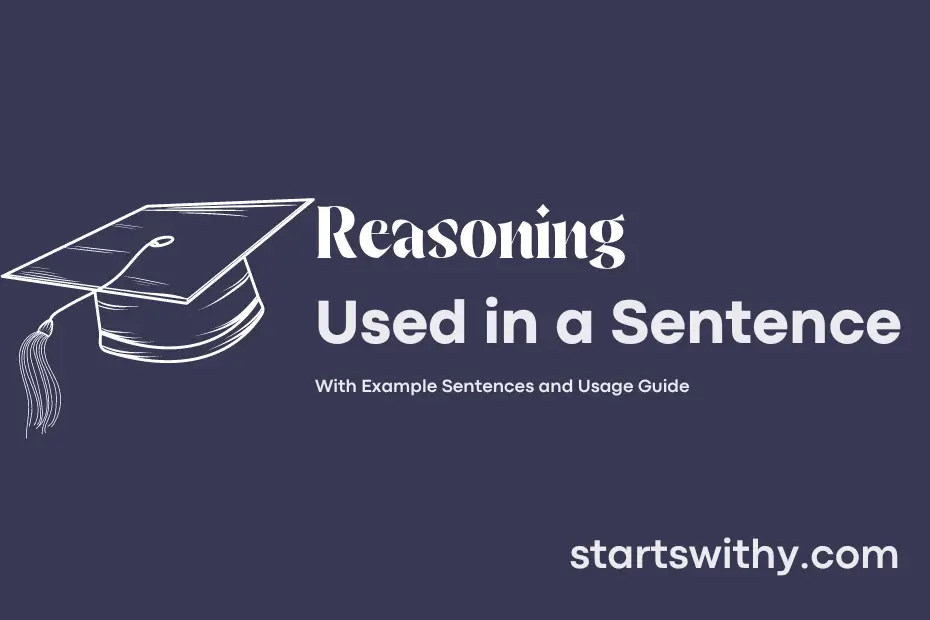Reasoning is the process of thinking about something in a logical way in order to form a conclusion or judgment. It involves examining facts, evidence, and principles to reach a sound decision or explanation.
Through the application of logical reasoning, we are able to analyze situations, solve problems, and make informed choices. This cognitive ability plays a vital role in critical thinking, decision-making, and problem-solving across various aspects of life.
7 Examples Of Reasoning Used In a Sentence For Kids
- You should eat your vegetables because they will make you strong.
- We need to brush our teeth because it helps keep them healthy.
- You should listen to your teacher because they are trying to help you learn.
- We should share our toys because it makes our friends happy.
- We should say “please” and “thank you” because it is polite.
- We need to wear a sweater because it is cold outside.
- We should look both ways before crossing the street because we need to be safe.
14 Sentences with Reasoning Examples
- Reasoning with your professors can help clarify doubts and deepen your understanding of the subject.
- It is important to practice reasoning in your assignments to develop critical thinking skills.
- Group discussions can provide different perspectives and enhance your reasoning abilities.
- Reasoning out loud while solving math problems can prevent errors and improve your problem-solving skills.
- Mooting competitions are a great way to showcase your reasoning abilities in a competitive environment.
- Participating in debates can sharpen your reasoning skills and improve your public speaking abilities.
- Keeping up with current affairs can help you apply logical reasoning to real-world situations.
- Collaborating with classmates on projects can help you strengthen your reasoning and teamwork skills.
- Reasoning through ethical dilemmas can help you make informed decisions in your personal and professional life.
- Mock interviews can help you practice reasoning and improve your responses to tough questions.
- Engaging in extracurricular activities can boost your social skills and reasoning abilities.
- Solving puzzles and brainteasers can be a fun way to exercise your reasoning skills.
- Internships provide hands-on experience that can enhance your reasoning capabilities in a professional setting.
- Seeking feedback from peers can help you identify areas for improvement in your reasoning strategies.
How To Use Reasoning in Sentences?
Reasoning is the process of thinking about something in a logical way in order to form a conclusion or judgment.
To use Reasoning in a sentence, start by identifying the main idea or argument you want to convey. Then, think about the evidence or facts that support your point. This could include examples, statistics, or personal experiences.
Next, organize your thoughts in a clear and logical manner. Make sure there is a clear connection between your main Reasoning and the evidence you provide.
For example, if you want to argue that exercise is important for overall health, your Reasoning could be: “Regular exercise is essential for maintaining a healthy lifestyle.”
Support this statement with evidence such as: “Studies have shown that regular physical activity can reduce the risk of chronic diseases like heart disease and diabetes.”
Finally, conclude your sentence by summarizing your main Reasoning and evidence. This will help reinforce your point and make your argument more persuasive.
By following these steps, you can effectively incorporate Reasoning into your sentences to communicate your ideas in a clear and logical way.
Conclusion
In writing, sentences with reasoning serve a crucial purpose by providing explanations, justifications, or connections between ideas. By including reasoning in sentences, writers can clarify their arguments, support their claims with evidence, and engage readers by guiding them through the thought process behind the statements being made. These sentences not only help build coherence and logic within a piece of writing but also enhance its overall persuasiveness and readability.
Whether expressing a viewpoint, analyzing a concept, or presenting a conclusion, sentences with reasoning are essential for effectively communicating ideas in a clear and structured manner. By employing this writing strategy, writers can strengthen their arguments, ensure their points are well-supported, and help readers better understand the underlying rationale behind the information being conveyed.



